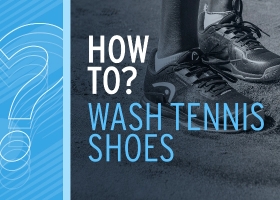5 Ways to Avoid Unforced Errors in Tennis
How cutting down on your unforced errors will enhance your game
Hitting winners feels good. When you dream of winning your next tennis match, you no doubt picture yourself smacking big, explosive shots past your opponent. And yet, in reality, hitting more winners isn't always the best way of increasing your chances of victory. You must do something less spectacular but even more effective: reduce your unforced errors.
Eliminating all the unforced errors in your game is going to be impossible (as even the professionals make plenty of them). Perfection isn't the goal here. But if you can cut down on your unforced errors, and get more balls into play, that is going to significantly improve your odds of winning the next time you step on court.
What is an unforced error in tennis?
As the name suggests, an unforced error is when you miss a shot when you weren't under pressure from your opponent. No one was forcing you to make that mistake. You were in control of your shot - you were in a good position, you were balanced and you had the time to play the stroke you wanted - and yet you still missed. Perhaps you were too ambitious with your shot and were aiming for the line. Maybe you had lost focus in a rally. Whatever the reason for the blooper, this was an avoidable error.
What is the difference between an unforced and a forced error in tennis?
If your opponent was putting pressure on you with the quality of their own shot, and that forced you to make a mistake, that is seen as a forced error.
However, there are times when it can be difficult to decide whether an error was forced or unforced. If you're looking at the live statistics when watching a professional tennis match, you might sometimes find you disagree with how errors are classified. It comes down to expectation, just as it does in your own matches - was that a shot you had expected to make? If so, it was an unforced error. Otherwise, it was a forced error.
What forces me to miss a shot?
If your opponent hits the ball deep and hard, that's going to take away some of the time you have to play your shot. You'll feel rushed and that could lead to a mistake. If they play the ball wide, or short, or you're at net and they loop the ball over your head, you're going to be scrambling to be in position and you won't be perfectly placed to hit your shot. You might be off balance and you won't have as much time to play your stroke.
How can I avoid unforced errors?
Here are 5 tips for reducing your unforced errors.
Play with more topspin
Topspin is your friend. Hitting the ball with more topspin will help you to clear the net and keep your shot inside the baseline, with the ball dipping because of the spin. You're still able to hit the ball hard, but you will have greater control of your power.
Go cross-court
Most of the time, play the ball cross-court rather than going down the line. You'll be hitting the ball over the middle of the net, which is the lowest part, and, as you're using the diagonal, the court will be longer and there will be less chance of hitting the ball beyond the baseline. At first, you might think that you're playing it too safe by going cross-court so much, but you will soon see that it enhances your consistency. You'll be staying in rallies for longer, giving your opponent the opportunity to be the one to make the error.
Don't aim for the lines
When playing an aggressive shot, don't make the mistake of aiming for the line. There's simply no need to play such high-risk tennis. Give yourself some margin for error by aiming inside the line. If the ball lands on the line, yes that will be a fabulous shot and it will probably end up being a winner. But that shouldn't be your target as you will find that you miss that shot more often than you make it.
Keep your focus and be patient
Don't let your mind wander during a rally. Keep your mind fully focused and you will cut down on the errors you're making. Also, be patient. Too often, a player gets impatient and goes for a winner too early in a rally when it would be smarter to wait for a better opportunity. If you can be patient and get more balls back into play, you will often find that your opponent makes an unforced error before you get to go for a winner.
Analyse your game
Is there one shot that is producing more unforced errors? If so, you ought to consider your technique and try to discover why that shot keeps letting you down. Then practise that shot as much as you can - you're aiming for consistency, for the ability to keep getting the ball back into the court. You might also find that improving your movement - giving you more time and space to hit the ball - is key to cutting down on your unforced errors.
Now have a go at incorporating these tips into your game
The lower the number of unforced errors, the higher the chance of winning the match. That’s going to determine whether you win, not how many winners you hit.

















